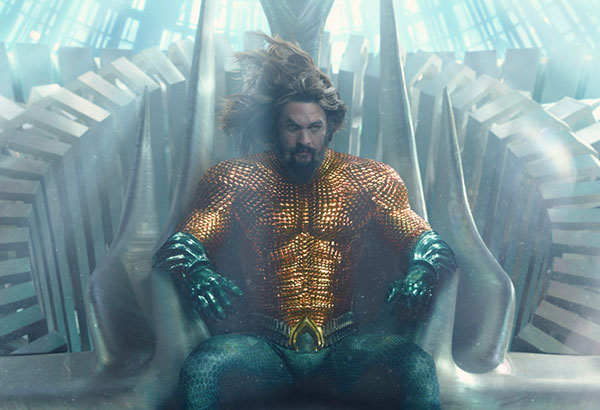The Final Chapter: How Aquaman and the Lost Kingdom Concludes the DCEU Saga
Attention, DC Universe enthusiasts - the time has come to dive into the depths of the cinematic universe we've come to love. As we prepare for the release of Aquaman and the Lost Kingdom, let's explore how this highly anticipated film serves as the concluding chapter of the DC Extended Universe (DCEU). Join us on a journey through the timeline, characters, special effects, and the future that awaits beyond the aquatic adventures of Aquaman.
Setting the Stage for the Final Chapter of the DCEU
The Journey So Far: The DCEU Timeline
Before we plunge into the oceanic realm of Aquaman and the Lost Kingdom, let's take a moment to reflect on the journey that brought us here. The DCEU timeline has been a tapestry of heroes, villains, and epic battles. From Superman's debut in Man of Steel to Wonder Woman's empowering origin story and the ensemble spectacle of Justice League, every film has contributed to the rich narrative tapestry.
The latest instalment in the DCEU, Aquaman and the Lost Kingdom, draws upon the events of its predecessors. The film weaves together key plot points from movies like Aquaman, Justice League, and Wonder Woman, creating a seamless continuation of the overarching story.
How Does Aquaman and the Lost Kingdom Fit Within the DCEU Narrative?
Aquaman and the Lost Kingdom is not merely a standalone adventure but a crucial piece in this DCEU puzzle. The film ties together loose ends, offering a satisfying resolution to storylines that have unfolded across multiple films, setting the stage for a grand conclusion.
Unveiling Aquaman and the Lost Kingdom
Introduction to the Storyline
Directed by the visionary James Wan, Aquaman and the Lost Kingdom promises a captivating storyline that delves deeper into the oceanic mythology. As Arthur Curry faces new challenges and uncovers hidden secrets, the film explores uncharted territories both in the sea and in the hero's personal journey.
What Can Fans Expect from the Aquaman Sequel?
Fans can anticipate a visual feast of underwater worlds, intense action sequences, and a narrative that pushes the boundaries of the superhero genre. Director James Wan's vision for the sequel promises to elevate the Aquaman story to new heights, blending spectacle with emotional depth.
The Ensemble Cast
Returning Heroes: The Stellar Cast of the Aquaman Movie
Jason Momoa reprises his role as the titular hero, leading a stellar ensemble cast that includes familiar faces such as Amber Heard as Mera and Dolph Lundgren as Nereus. The return of these characters adds continuity to the narrative, offering a sense of familiarity amidst the new challenges.
Fresh Faces: New Characters and Their Portrayals
Aquaman and the Lost Kingdom introduces new characters, portrayed by talented actors who bring fresh energy to the DCEU. Among them are Patrick Wilson as Orm Marius, the former king of Atlantis who committed deplorable crimes against the city, and is imprisoned.
And also new to the story is Black Manta. Our primary antagonist, he’s a ruthless pirate who wields the powerful Black Trident and who’s bent on eliminating Aquaman. Why? You just have to watch the movie.
Their roles contribute to the evolving dynamics of Aquaman's world, creating an energetic blend of the old and the new, and promising great moments of conflict and triumph for us viewers.
The Future Beyond Aquaman and the Lost Kingdom
Is it the End? Well, Maybe Not
Here’s why:
The release of Aquaman and the Lost Kingdom marks a significant moment in the ongoing evolution of the DC Universe, offering fans a glimpse into the expansive and ever-changing world of DC superheroes. As the cinematic universe continues to unfold, it raises the question: What lies ahead for the DC Universe?
1. Expanding the Aquaman Mythos:
Aquaman and the Lost Kingdom not only serves as a sequel but also promises to deepen the mythos surrounding the aquatic hero. As discussed, with Jason Momoa reprising his role as Arthur Curry, the film is likely to explore untold aspects of Atlantis, its history, and the challenges it faces. This expansion of the Aquaman lore sets the stage for future films within the DC Universe to explore the rich tapestry of the underwater realm.
2. Connectivity and Crossovers:
In recent years, DC has shown a commitment to interconnectivity within its cinematic universe. The success of Aquaman and other films like Wonder Woman and Shazam! has laid the groundwork for potential crossovers and team-up movies. Fans can anticipate more interconnected storylines, creating a cohesive narrative that spans multiple characters and story arcs.
3. Exploring Multiverses:
The concept of the multiverse has been a key theme in recent DC projects. With the release of films like The Flash and Doctor Strange in the Multiverse of Madness from Marvel, it's clear that exploring alternate realities and parallel universes is a trend in superhero cinema. This opens up endless possibilities for storytelling, allowing the DC Universe to delve into different versions of beloved characters and explore diverse narratives.
4. Diversity and Inclusion:
The DC Universe is increasingly embracing diversity and inclusion, both in front of and behind the camera. Films like Birds of Prey and Shazam! have showcased a commitment to representing a wide array of characters and perspectives. As the universe expands, fans can expect to see even more diverse heroes taking the spotlight, reflecting the diverse world we live in.
5. Exploration of Lesser-Known Characters:
Beyond the iconic heroes like Batman and Superman, DC has a vast roster of lesser-known characters with rich stories waiting to be explored. The success of Guardians of the Galaxy in the Marvel Cinematic Universe demonstrated the potential for lesser-known characters to capture the audience's imagination. DC could follow suit by bringing characters like Blue Beetle, Zatanna, or Booster Gold to the forefront in standalone films or team-up adventures.
6. Technology and Visual Spectacle:
With advancements in technology, each new DC film brings a visual spectacle that pushes the boundaries of what is possible on the big screen. Aquaman showcased the breathtaking underwater world of Atlantis, and future films are likely to continue this trend, using cutting-edge technology to bring comic book worlds to life in ways that were once unimaginable.
7. Global Storytelling:
The DC Universe is not limited to American-centric stories. As evidenced by Wonder Woman exploring Themyscira and the global scope of Aquaman, future films may continue to embrace a global perspective. This approach allows for diverse settings, cultures, and mythologies to be incorporated into the narrative, creating a more inclusive and expansive storytelling experience.
With all of that said, it’s safe to assume that the release of Aquaman and the Lost Kingdom is a pivotal moment that sets the stage for the continued growth and exploration of the DC Universe. With a focus on expanding character mythologies, interconnected storytelling, and embracing diversity, the future of the DC Universe holds the promise of captivating audiences with innovative narratives and visually stunning cinematic experiences. As the universe continues to evolve, fans can eagerly anticipate a diverse array of heroes and stories that will shape the landscape of superhero cinema for years to come.
Aquaman and the Lost Kingdom releases on the 22nd of December.
For more information, watch this space.
Click here for more exiting movie news, and all the exciting new and forthcoming attractions brought to you by Ster-Kinekor.

